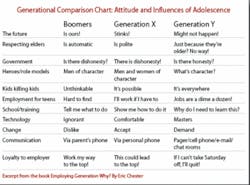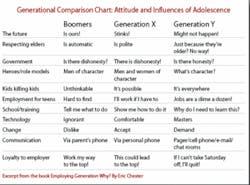Bridging the generational gap
For more on this topic, go to www.dentaleconomics.com and search using the following key words: younger workers, baby boomers, Generation X, Generation Y, work ethic.
Sound familiar? Employers all over the country are scratching their heads at the young generation entering the workforce. As they say goodbye to the generation of retiring baby boomers, employers are wondering how to effectively and successfully manage today's emerging primary workforce.
Employers and managers — now more than ever — must begin to understand the younger generation of workers and begin making adjustments to effectively manage them. Failure to do so could have a negative effect on the business.
The baby boomer generation makes up about 76 million individuals. By all estimates, most will be retiring in the next 10 to 15 years. This leaves Generation X and Y to run the show. While most practices have grown accustomed to the uniqueness of Generation X, it is Generation Y that seems to be causing the most consternation for employers.
Why? Simply put, they're quite different from any generation before them.
Most demographers agree that baby boomers were born between 1946 and 1964. Generation X was born between 1964 and 1979, and comprises about 41 million people. About 60-plus million people make up Generation Y, born between 1980 and 1994.
Every generation is shaped by the world it grows up in. Family, school, religion, friends, and media are some of the sources that form the foundation of our core values. In fact, research indicates that by the time we reach the age of 16 we have already locked in most of the values and beliefs that will shape our attitudes and decisions, both personally and professionally, for the rest of our lives.
Given the differing eras, each one's prevailing values, social morals and societal norms, the chart below represents some of the key differences of these three generations.
As you can see, each generation's behavior, attitude, and actions on the job are different. This presents challenges for employers to learn and adapt in order to effectively relate and manage both Gen X and Gen Y employees.
While there are very broad generalizations that can be applied to any one generation, it is important to note that there are always exceptions to the rules. We will focus on Gen Y because these are the people who make up the workforce of tomorrow.
Demographically, one in three is not Caucasian, two in four come from a single-parent home, four in five have working mothers, and more than 2 percent have one or both parents incarcerated (from Employing Generation Why? by Eric Chester).
Gen Y is fascinating because, unlike any other generation, it is technologically astute. Never knowing a world without computers, DVDs, PlayStations, e-mail, cell phones, etc., has given Gen Yers uniqueness as masters of the technological world, often well beyond the managers with whom they work. Employers are well-advised to tap into this knowledge to keep their own practices technologically advanced.
Patient is not a word used to describe Gen Y employees. Gen Y grew up in an age where speed is the norm, things come at us quickly, and change is just as fast. It's no wonder Gen Y doesn't buy into the "patience is a virtue" concept. However, this also means that they love change and are highly adaptable. A Gen Y employee will expect change, may even create the change, and can teach employers to use change to their full advantage.
Gen Y is prone to questioning things. "Why do I have to know this?" "Why do I have to do it this way?" "Why should I trust/believe you?" Gen Y does not do things "just because someone said so" or "because that's the way it's always been." As frustrating as it may be to have these questions raised, a lot of innovative thinking and ideas can come from them. It's important to note that the technology that Gen Y uses has also been created by them, in some respects. Employers can benefit from this mindset by learning new and more efficient ways to operate their businesses.
Perhaps the most powerful management tool an employer has for working with and employing Gen Y is caring for them and giving them time. Shattered families and overcrowded schools have kept a lot of these individuals from developing strong connections to others. In addition, shootings in schools, 9/11, war, etc., has caused these young people to shield their hearts and put up barriers to their emotions. As a result, positive or negative emotions do not come easily. This changes when managers develop a more personal touch to managing others. One who builds rapport, shows a caring attitude, and invests time will engage the worker and create lasting loyalty.
Recruiting Gen Y is where an employer's creative skill will be the most needed. This unique field of employees will not respond to traditional recruiting methods or work environments.
As mentioned previously, technology is paramount to Gen Y. Recruiting through standard newspaper ads may not get the most qualified applicant pool. The Internet can be a strong network. There are many online recruiting sites that can be used such as Hotjobs.com or Monster.com. Even more creative would be having a presence on the social networking Web sites such as Facebook or MySpace.
Salary and benefits rank very high with Gen Y. Therefore, employers should have a comprehensive and competitive package. Selling that package means being able to differentiate oneself from the competitors. Gen Y wants to know, "Why should I work for you rather than someone else?" This may mean offering a benefit you have never offered previously or providing more of it. For example, Gen Y places a high value on work/life balance, so consider offering flex time or quicker vacation accumulation.
Streamline the recruiting process. Remember that lack of patience quality? Gen Y doesn't want to go through all the red tape to get a job; they don't have the patience for it. Create job applications online, shorten the length of time between applying, interviewing, and hiring, and eliminate unnecessary aspects of the recruiting process. This generation won't wait; they'll change their mind and move on to other opportunities.
It's different, but that's OK
The Gen X and emerging Gen Y workforces are, on many levels, much different than what has been the expected norm of the baby boomer generation. This is not necessarily bad — it's just different, and thus requires employers to rethink their approach to recruitment, hiring, communication, and management. When you invest the time to understand Generation Y and create a place where they will want to work, you will have a strong workforce that is fiercely loyal and hardworking.
Bent Ericksen is the founder and Tim Twigg is the president of Bent Ericksen & Associates. For more than 25 years, the company has been a leading authority in human resources and personnel issues, helping dentists successfully deal with the ever-changing and complex labor laws. Both authors are members of the Academy of Dental Management Consultants. To receive a complimentary copy of the company's quarterly newsletter or to learn more about their services, contact them at (800) 679-2760 or at www.bentericksen.com.

